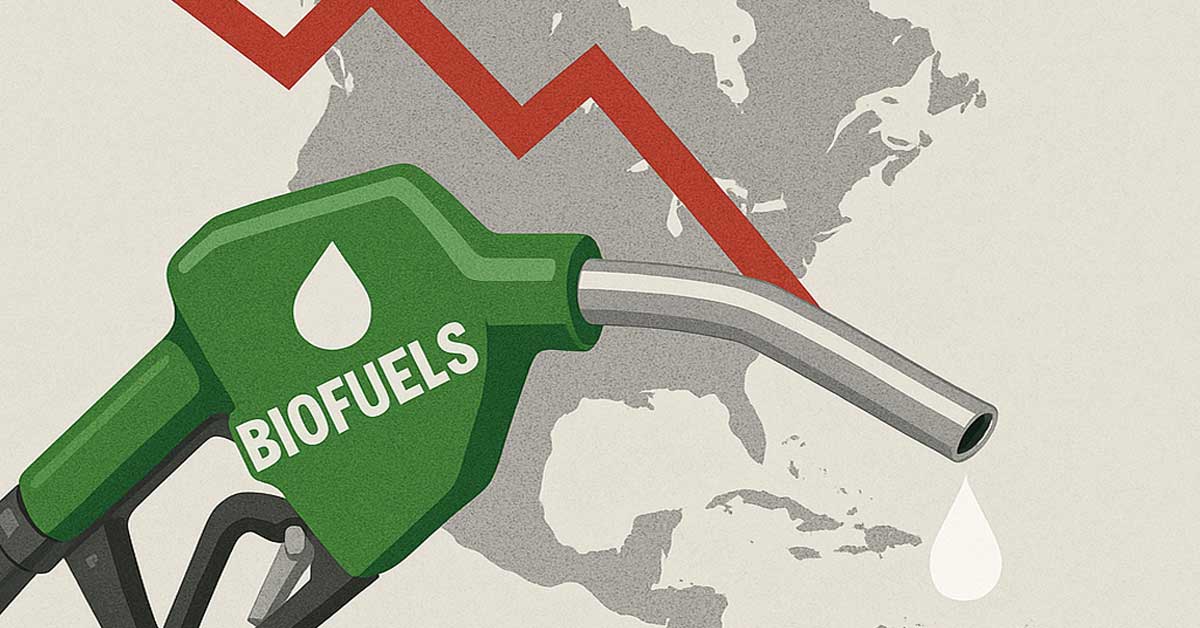2 min read
North American Biofuels Market Contracts Amid Tariffs, Policy Shifts
ResourceWise
:
Apr 3, 2025 2:10:31 PM

The North American biofuels industry has seen its share of uncertainty thus far in 2025. Trump’s past stance on green energy policy has offered little confidence to investors and operators. And the current situation with global trade has only worsened market hesitation.
These developments have already made their mark with a contraction in the US biofuels market. What exactly does this downturn look like, and what are the broader implications for the industry?
Biofuel Projects and Production Suspended, Shuttered
According to a Reuters report, the US biofuels market is experiencing a significant downturn due to escalating trade tensions and ambiguous policy directions. This decline threatens the progress made in green energy initiatives and poses challenges for agricultural sectors that have long benefited from biofuel production.
The US administration's wavering stance on tariffs has already led to increased costs for imported feedstocks, essential for ongoing biofuel production.
Uncertainty in current and future market conditions has prompted several companies to scale back operations. For instance, Federated Co-operatives Limited in Canada has halted a major renewable diesel project, citing rising costs and policy unpredictability. Similarly, a biodiesel plant in Iowa has been idled until the market stabilizes.
Agricultural Markets Also Impacted
The biofuels sector has historically provided a reliable market for farmers' crops. Oilseeds like canola and soybeans play a pivotal role in powerful biofuel production. The current downturn is causing both price drops and planting uncertainties.
Canadian canola farmers and US soybean growers alike are seeing decreased demand. It’s increasing financial strain on their operations and creating several challenging decisions for the upcoming planting season.
Policy Ambiguity and Industry Response
The lack of clarity regarding biofuel subsidies and volume mandates under the Renewable Fuel Standard (RFS) has further complicated the landscape. Industry leaders are urging the administration to provide definitive guidance to support producers and stabilize the market. This is especially evident with 45Z as stakeholders await the end of a public comment period on April 10.
The Environmental Protection Agency (EPA) is expected to set new mandates soon. Current discussions suggest potential increases in renewable diesel and biodiesel requirements. However, nothing is set in stone yet.
Effects on Rural Communities and Biofuel Workers
The contraction of the biofuels sector extends beyond economic metrics. It is also directly affecting rural communities reliant on biofuel production facilities for employment and economic activity.
Setbacks in biofuel production also hinder efforts to reduce carbon emissions and transition to cleaner energy sources. The slowdown adds more challenges to achieving broader CO2 reduction objectives.
What’s Next for the North American Biofuels Market?
The North American biofuels industry stands at a crossroads.
Trade policies, tariffs, and market uncertainty are currently leading the charge. What this means is a lot of hesitation on operations (and likely much more to come).
Clear and consistent policy frameworks are essential to bolster the sector, support agricultural markets, and advance environmental goals. Stakeholders across the spectrum need clear and decisive knowledge to navigate the storm and develop a productive path forward.
Subscribe to Stay Up-to-Date on Critical News and Updates
The biofuels industry can move and change quickly. With so many prospective changes on the horizon, it's imperative to stay up-to-date with what's happening in US policy, global trade, and new and emerging technology.
The ResourceWise blog covers all crucial stories across the global biofuels and renewables industry. Subscribe to our blog and monthly newsletter so you’ll never miss out on any important updates that may affect your business.





